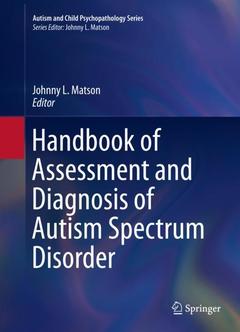Handbook of Assessment and Diagnosis of Autism Spectrum Disorder, 1st ed. 2016 Autism and Child Psychopathology Series
Coordonnateur : Matson Johnny L.

- Types of ASD assessment.
- Report writing for ASD evaluations.
- Stress and satisfaction in the diagnostic process.
- Clinical and neuropsychological perspectives from comorbid diagnosis of ASD and ADHD.
- Executive functions in ASD.
Synthesizes numerous research studies and findings on assessment and diagnosis of autism spectrum disorder (ASD)
Addresses the history and use of clinical observation as well as how assessments have grown increasingly structured and specialized
Examines multiple disorders often comorbid with autism, including ADHD, anxiety, depression, and sleep problems
Explores the implications of DSM-5 and ICD-11 on treating autism?
Date de parution : 02-2016
Ouvrage de 477 p.
17.8x25.4 cm
Date de parution : 10-2017
Ouvrage de 477 p.
17.8x25.4 cm
Thèmes de Handbook of Assessment and Diagnosis of Autism Spectrum... :
Mots-clés :
ADHD comorbid with autism; ASD and comorbid conditions; Anxiety disorders comorbid with autism; Asperger’s Syndrome assessment and diagnosis; Assessment of autism spectrum disorder; Clinical observation of autism; DSM-5 and autism assessment and diagnosis; Diagnosing; screening; and monitoring ASD; Executive functioning and ASD; ICD-11 and autism assessment and diagnosis; Intellectual disabilities and autism spectrum disorders; OCD and anxiety comorbid with autism; Preschool and early childhood assessment of ASD; Psychological measurement of ASD with comorbid disorders; Report writing and autism assessment; Screening methods for autism spectrum disorder; Seizure problems and autism; Severe psychopathology comorbid with ASD; ToM and autism spectrum disorder; fMRI and autism



